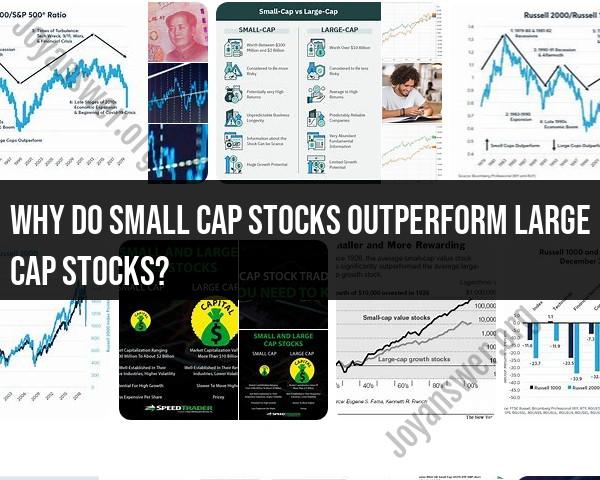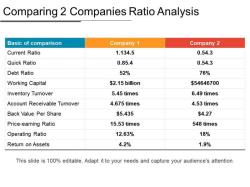Why do small cap stocks outperform large cap stocks?
Small-cap stocks can sometimes outperform large-cap stocks, and this phenomenon is influenced by various factors. It's important to note that investing always involves risks, and past performance is not indicative of future results. Here are some reasons why small-cap stocks might outperform large-cap stocks:
Growth Potential:Small-cap stocks often have more room for growth compared to large-cap stocks. Smaller companies may be in the early stages of expansion, introducing innovative products, or entering new markets, which can contribute to higher growth rates.
Undervaluation:Small-cap stocks may be overlooked or undervalued by the market, providing opportunities for astute investors to identify hidden gems. As these companies grow and gain recognition, their stock prices may rise.
Flexibility and Adaptability:Smaller companies are often more nimble and adaptable than larger corporations. They can quickly respond to market changes, capitalize on emerging trends, and make strategic shifts to enhance competitiveness.
Market Inefficiencies:The market for small-cap stocks may be less efficient than that for large-cap stocks. This inefficiency can lead to mispricings and create opportunities for investors to find stocks that are trading below their intrinsic value.
Mergers and Acquisitions (M&A):Small-cap stocks may be attractive acquisition targets for larger companies looking to expand their portfolios. Mergers and acquisitions can result in significant premiums for shareholders of the acquired small-cap company.
Economic Expansion:During periods of economic expansion, small-cap stocks may benefit more than large-cap stocks. Smaller companies, particularly in sectors like technology and healthcare, can experience accelerated growth as the overall economy expands.
Less Institutional Ownership:Small-cap stocks may have lower institutional ownership compared to large-cap stocks. As these stocks gain attention from institutional investors, increased demand can drive up prices.
Market Sentiment:Positive market sentiment and investor optimism can have a stronger impact on small-cap stocks. When investors are bullish, they may be more willing to take on the higher risk associated with smaller companies.
Dividend Growth:Some small-cap stocks may reinvest their earnings into growth opportunities rather than paying dividends. If these investments result in higher earnings and stock appreciation, investors benefit from capital gains.
Sector Rotation:Market conditions and investor preferences may lead to sector rotations, favoring certain industries that are well-represented in the small-cap space.
While these factors contribute to the potential outperformance of small-cap stocks, it's crucial for investors to conduct thorough research, understand the risks, and diversify their portfolios. Small-cap stocks can be more volatile, and their performance may vary based on market conditions and economic cycles. As such, investors should carefully consider their investment goals, risk tolerance, and time horizon before allocating funds to small-cap stocks.
Why do small-cap stocks tend to outperform large-cap stocks?
While small-cap stocks can indeed outperform large-cap stocks over the long term, it's important to remember that it's not guaranteed and comes with higher risks. Here are some reasons why small-cap stocks may have the potential for higher returns:
Growth Potential:
- Higher growth rates: Smaller companies often have more room for rapid growth compared to established large-cap companies. They can be quicker to adapt to new technologies and market trends, potentially leading to faster revenue and earnings expansion.
- Undervalued potential: Due to less analyst coverage and investor attention, small-cap stocks can sometimes be mispriced, offering opportunities for savvy investors to discover hidden gems with untapped potential.
Market Dynamics:
- Lower liquidity: Small-cap stocks generally have lower trading volumes and are less liquid than large-cap stocks. This can create opportunities for price movements due to smaller shifts in demand, potentially leading to significant gains or losses.
- Merger and acquisition (M&A) activity: Smaller companies are more attractive targets for M&A by larger companies seeking to expand their product offerings or enter new markets. This can result in significant windfalls for investors of the acquired company.
Investing Considerations:
- Higher volatility: Small-cap stocks tend to be more volatile than large-cap stocks, meaning their prices can fluctuate more dramatically, both upwards and downwards. This requires a higher risk tolerance and longer investment horizons to weather market fluctuations.
- Limited information: Researching and analyzing small-cap companies can be more challenging due to less readily available information compared to large-cap companies. This requires extra effort and due diligence from investors.
- Liquidity risk: The lower liquidity of small-cap stocks can make it harder to buy or sell them quickly, especially during market downturns. This can be a concern for investors needing to access their invested capital readily.
Ultimately, deciding whether to invest in small-cap stocks depends on your individual risk tolerance, investment goals, and time horizon. While they offer the potential for higher returns, they also come with significant risks. Diversifying your portfolio across different asset classes and investment vehicles is crucial for managing risk and achieving your long-term financial goals.
Do your thorough research, consider seeking professional advice if needed, and invest according to your risk tolerance and financial objectives. Remember, past performance is not a guarantee of future results, and even small-cap stocks can underperform large-cap stocks at times.












